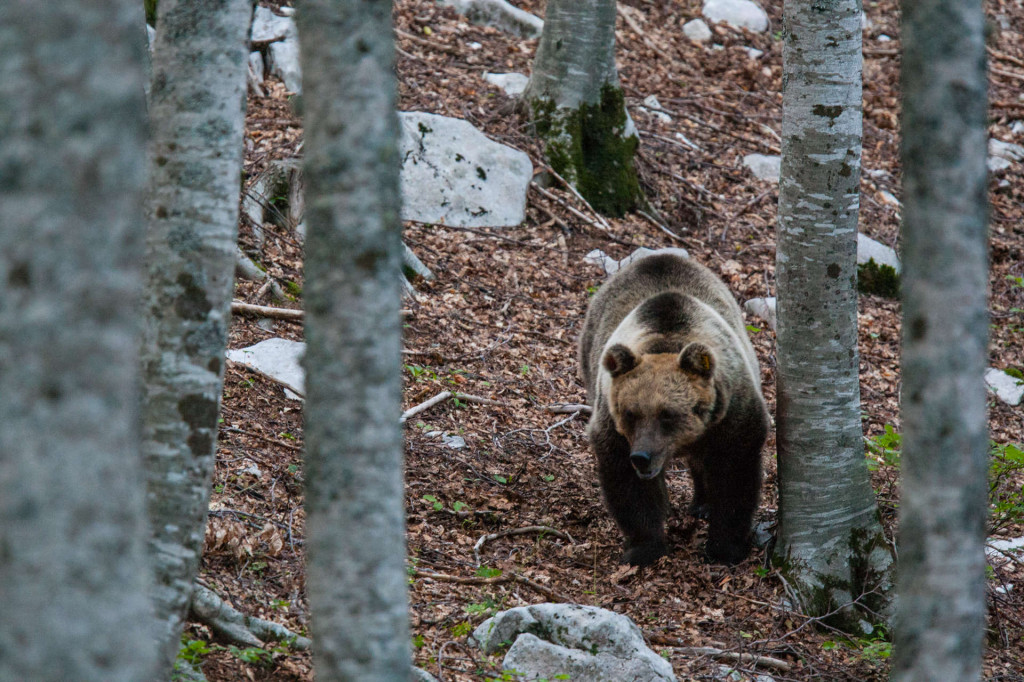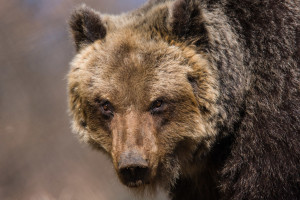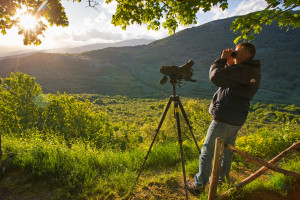Finally, He came. It had been already five or six afternoons with me there waiting, lurking under a juniper in the anonymous valley at the edge of the beech forest. I was feeling the fatigue from the many hours of waiting, but I really didn’t get bored.

A day in May
In the first evening a wolf, perhaps lost in its thoughts, had passed less than ten meters from my position; I had closely followed the exciting dalliances of cuckoos, and every afternoon I had fun searching with my binoculars for deer, wild boar, hares and foxes in the surrounding meadows. That day, chill from the downpours of the previous days, was now drawing closer and the sunset was still different from the previous ones casted spots of lights on the mountain tops in the distance. After the sun had dropped behind the line of the hills and the nightjar begun to sing, I realized that even that day He would not have come, and so I disassembled the camera equipment, that had been for hours on the tripod. Too bad: I really needed Him.
So, I stood up and loaded the backpack on my shoulders, turning back only to give a last glance at the valley. And then, as tradition dictates, I saw Him. He was moving slowly through the old junipers, with his muzzle down and the fur golden and shiny, beautiful and perfect like all the good things of this world.
With sweaty hands and drumming heart, I crouched down again, slowly unloading the backpack and trying to quickly mount the camera gear with all necessary precautions to minimize noise. After some twenty seconds, the camera and telephoto lens were ready and I, on tiptoe, approached Him. My legs were shaking, but He was busy sniffing among rocks and shrubs and the wind was blowing towards me. Seventy meters … fifty … forty … I so wanted to spend that evening with Him.
More out of habit than from actual need, I hid under a blackthorn. I then placed the tripod, framed the picture and pressed the shutter release. He heard it and stopped immediately, turning His great head toward me: I was too close. The ears pointed in my direction, the nose up to sniff the wind (I could hear the sound of it) and the two little brown eyes that seemed rather perplexed in the advancing darkness. I remained still and holding my breath, waiting for His inevitable escape; furious with myself for my unseemly hybris and impatience. But, instead of running away, He sat down, continuing to look in my direction. And, for once, in His presence I felt something that I could define like an ancient and healthy fear. I felt so small and useless, while He was so big in the viewfinder of my camera! Dark brown, almost chocolate-colored on the flanks and abdomen, with cappuccino-colored spots on his head and back, at times tinged with cream in the twilight.
And even in this very moment of magic, all I could think of was to take another, stupid picture. He turned to the side, trying in any way not to look at me. Then, I understood and so lowered my gaze and the telephoto lens to the ground. Something like a light electric wave passed between us and immediately vanished.
Shortly after, He got up and started to search for food again, moving slowly, but with that special way at the same time naïve and determined that distinguishes Him. I followed at a distance, sparing the camera shots not to bother Him further and also because the light was almost gone. He ignored, perhaps accepted me. And so, once again, it was just me and Him in these humble Apennines: all for me, my dear old Marsican Brown bear!
Finally, I was able to live again this true Italian miracle; perhaps, one of the best things that are left in this world. Full of gratitude and respect, in my heart I felt I had to solemnly bless those sacred moments and wondered why I was not allowed to experience them every day.
The Bear, probably unaware of such clumsy mysticism, slowly climbed up the slope in front of me, elegantly turning over the large rock boulders He found along his path, and, when neither my eyes nor my camera could any longer make out His outline, I waved Him goodbye and headed rapidly in the opposite direction. My legs were flying over the rocks, as my head was elsewhere. I still had some distance to cover in the dark to reach to the car.

A day in June
Once again happily lost among the benevolent limestone peaks of the Apennines, I was following an ancient path that climbed among centuries-old beech trees. Out of the woods, the clearing appeared to me in all its radiant beauty, the deep-green grass was dotted here and there with huge rock boulders overturned, all blinding white in the summer afternoon. In some places the grass had been trampled by a large animal; the stems browsed on top. Then, a big black turd lying there, fresh and full of vegetable fragments, opened a world of possibilities. Once again I felt I was on His steps in His territory and I knew I was privileged. I had two more hours before sunset.
I sat between two large rocks and waited: my shape confused with the shadows, my smell hopefully brought away by the wind. Small clouds flowed fast in the sky; in the woods, a collared pigeon could not stop cooing and distracted me from my thoughts. A roe buck came timidly out to my right, all proud in his beautiful summer coat, now nervously grazing not far away from me.
Every now and then he suddenly raised his nose over the grass, pointing his ears to the treeline at the end of the valley, as in alarm. Hopeful, I followed with anxiety and mild adrenaline rush those sudden movements and stared at the woods along with the deer. In my heart, I was looking forward to the appearance of that unmistakable shape and the strong and healthy emotion that always accompanied it.
Waiting, thoughts, weariness, hope. Meanwhile, the light faded and a skylark was singing in the end of that day, so small in the azure skies, and higher than any eagle. I was grateful that very lark had escaped the hunters last fall. It was all so beautiful, but it was late and I had to go home. I got up and, not without regret, I scared off the roe deer, which already was barking away. While loading the backpack, I followed with the gaze how the trail entered the woods, dark as the mouth of a large animal. A slight shiver went along my back. It was certainly not the first time I went through the beech woods alone at night! I left the clearing and entered the trees. As these thickened, my eyes could barely make out the outlines and the shadows seemed more a projection of my mind than real things. I was forced to keep my eyes fixed on the stones in the path, still visible, but I was reluctant to turn on the flashlight, indulging in that black and white world, devoid of any references.
Steps, rustling, the wind in the leaves and the squeak of dormice: the beech forest came alive. At every noise my heart was sinking; every curve of the path was a barrier to overcome. The air was fresh and, above my head, the black shapes of twisted beech trees were silhouetted against the first stars of the night. Rehearsing next to an old tree stump, which I had seen on the way up and that a bear in search of insects had completely destroyed with its paws, I thought back to the overturned stones in the clearing and I felt the power of that presence and, again, that electric wave. It was not fear, but a very strong and primitive feeling, which perhaps I could describe as a mix of sharp attention, increased sensorial capacity, intense communication with the environment and a profound sense of humility.
I felt so small and the world around me didn’t seem so obvious anymore. It was strange, but I liked it. Step by step, it became clear to me that it was something important and rare, which came from afar. And so I indulged in it: it was the gift of the Bear.
It was its’ mere presence, in fact, to establish the limits of those places: vast and timeless as the story they were telling. I wondered what would happen to the beech forest, to those mountains, if there would have no longer been bears there. Who else would have allowed us, people of the third millennium, to experience these emotions like hunters from the Pleistocene age? What else could have re-established the link between us and the wilderness?
One hundred, fifty, or just one, it does not really matter: if there is still The Bear.
It would be nice, I told myself, to share those feelings with others, even with the greedy “developers” of these mountains and those few rebellious livestock owners. Who can take significant decisions but does not. It would be nice, yes, but I fear few would understand, because I know that the gift of the Bear is sadly outdated. An hour and a half later I finally get to my car, and have woods and wilderness locked outside of the vehicle. Later, in my bed, I thought back to the Bear. Maybe He was out that night, roaming under the stars as He always did, I thought, and so I slept peacefully, knowing that it was not a dream.

A day in April
More than two years passed since those magic moments. Memories did not fade, but my perspective changed a little. Too many news referring to bears having died by gunshot, poison, diseases transmitted by livestock and road traffic collisions saddened the past months. Worries surged, as did anger: one looks everywhere for answers and arguments. It is unacceptable to see these bears vanish like this! And so, beside the obvious moral and ecological values of the small brown bear population that survives in the Central Apennines, which economical value, I wonder, could be given to a single bear? Beside the role as a keystone species and, perhaps, an umbrella species for the conservation of the whole Apennine ecosystem, what really goes lost when a bear dies?
Surveys and studies have been undertaken to assess the value of polar and brown bears in North America, but, to my knowledge, nothing like that has been done in Europe yet. A study carried out by the Center of Responsible Tourism Department of the Stanford University of Washington (USA), in fact, makes clear that the ecotourism business aiming at watching bears in nature is much more profitable than bear hunting. Financial revenues coming from tourism, according to the report, are 11 times higher than those coming from trophy hunting. And yet, each year the public administration of British Columbia is paying more money to manage bear hunting activities than those around wildlife watching. It seems obvious, then, that a live bear is worth much more than a dead one.
In Europe, one could ask all the companies and people who offer bear watching and bear photography tours, quite profitable activities which are since decades being developed in countries like Finland, Sweden, Romania and Slovenia, for example. In Italy, there is not yet a tourism mainly focused on bear watching, but hundreds of people coming from several European countries already reach the region Abruzzo, in Central Italy, “just” in the hope to watch one of the last fifty Marsican brown bears. French, Dutch, Belgian and British tourists, just to list a few of the most frequent nationalities, spend up to two weeks and even more in the villages of the Abruzzo National Park (which sports a bear as its symbol), hiking the spectacular limestone mountains. Scanning with their binoculars over the green slopes in order to try to briefly glimpse the hump of the world’s rarest bear. These visitors often hire local guides, take part in organised excursions and outdoor activities, sleep in the existing hotels or B&Bs and eat in local restaurants and bars: an serious source of income for the communities, but maybe difficult to estimate.
One could just wonder what would become of Italy’s oldest and most famous national park if its very symbol would be gone. Who would think of reaching this last place in crowded Italy, if its most charismatic protagonist one day would become extinct? Italy’s largest and most protected mammal species, in fact, may represent all what conservationists, nature enthusiasts and wildlife scientists have been fighting for, over decades. A living bear is so infinitely much more than just 200 kilos of muscles and fat. It is about mystery and identity, about heritage and continuity. It is the history of these mountains and the culture of its inhabitants. It is a door through which to access another, wilder world. It is hope for better preserving Italy’s whole natural heritage and it is a brand for the Apennines’ unique mix of nature and tradition. With each bear that gets killed, a part of this all gets lost, and with it goes for ever also a fantastic chance of assuring an economic future for the local communities. It seems actually not really possible then, I am afraid, to give a precise value to a bear, because it is Priceless…
